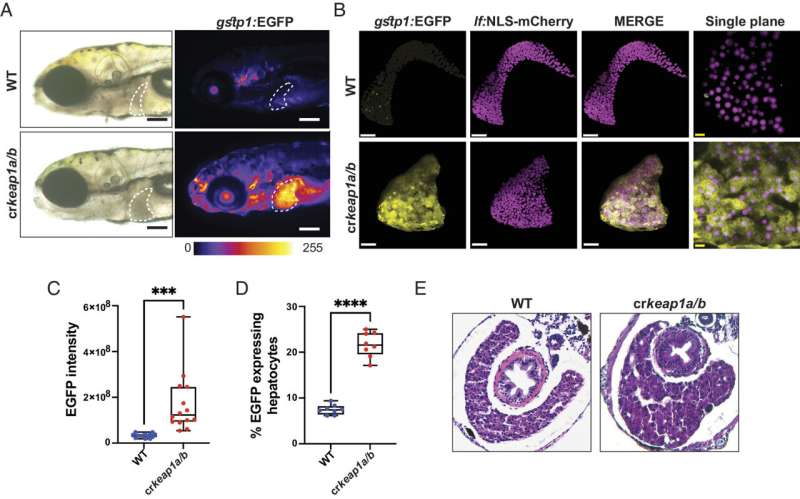This article has been reviewed according to Science X's editorial process and policies. Editors have highlighted the following attributes while ensuring the content's credibility:
fact-checked
proofread
How mutations to a key liver cancer pathway contribute to tumor progression

New Peter Mac research recently published in Proceedings of the National Academy of Sciences (PNAS) has discovered a fundamental breakthrough related to the development of liver cancer.
The research team, led by Dr. Andrew Cox and Dr. Kristin Brown, were motivated to understand how the KEAP1-NRF2 pathway—identified as one of the top 10 driver pathways in cancer—contributes to the initiation of liver cancer.
They found that mutations in the KEAP1-NRF2 pathway rewire metabolism by increasing the number of lysosomes in the cell. In healthy settings, lysosomes provide an important function to break down and dispose of damaged materials in the cell. However, in a cancer setting, lysosomes have been found to contribute to tumor progression.
"It was through a combination of unbiased approaches that we came across the relationship between the KEAP1-NRF2 pathway and lysosomes," Dr. Brown said.
"We know that lysosomes make cancer cells grow even more out of control than they normally would and that they contribute to the development of therapy resistance."
"We're very excited about this research. We think there is huge potential with respect to understanding why liver cancer develops and how we can better treat patients diagnosed with this disease."
"It is incredibly important that we find out how lysosomes are regulated so that we can develop new cancer therapies in the future."
With the incidence of liver cancer increasing and few existing therapeutic options to treat this disease, Dr. Cox added that it's therefore critical to understand the processes driving liver cancer development
"The KEAP1-NRF2 pathway plays an important role in protecting healthy liver cells from oxidative stress," he said.
"Curiously, this pathway is mutated in a variety of cancers, including liver cancer. Our discovery that KEAP1-NRF2 pathway activation increases the abundance of lysosomes provides important fundamental insights into liver cancer development."
This important collaborative work was carried out in the Cox and Brown labs and driven by Ph.D. student Athena Ong, who is now working as a postdoctoral researcher at Peter Mac.
"Athena has already initiated follow-up studies to look more in depth at the role of the lysosome in liver cancer," Dr. Brown said.
More information: Athena Jessica S. Ong et al, The KEAP1–NRF2 pathway regulates TFEB/TFE3-dependent lysosomal biogenesis, Proceedings of the National Academy of Sciences (2023). DOI: 10.1073/pnas.2217425120





















